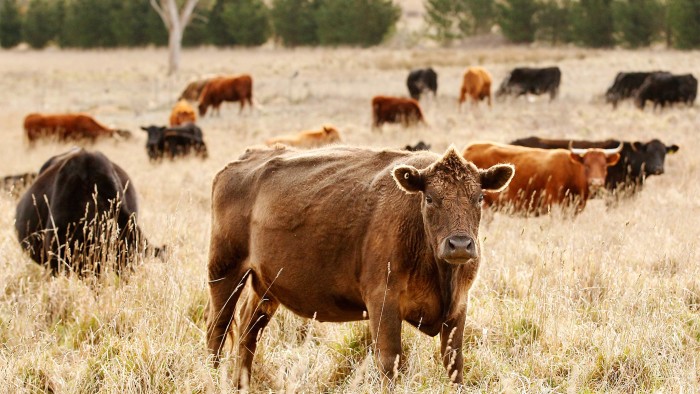Cloned cows create a new beef over climate change


Roula Khalaf, Editor of the FT, selects her favourite stories in this weekly newsletter.
It has become something of a family ritual: school successes, new jobs and other milestones are toasted in a splendid local tavern above plates of steak and chips. These outings feel especially indulgent given that we are trying to consume less red meat for both health and environmental reasons.
But while guilt-tripped westerners are passing up the fillet steaks — 12 per cent of Britons claim to be vegan or vegetarian, rising to 20 per cent of 16-24 year olds — other countries are happily tucking in. The richer the country gets, the more meat its citizens crave. And now China is turning to biotechnology to keep aspirational appetites sated.
BoyaLife, a Chinese biotechnology company, is teaming up with a Korean research company, Sooam Biotech, to clone 1m cattle a year to feed public demand for high-quality beef. The joint venture — no pun intended — has been announced by China’s official Xinhua news agency and promises to make the country a major player in agricultural biotechnology.
The prospect of bespoke beef is startling in the light of the forthcoming talks in Paris on climate change, where 138 heads of state will be in attendance. After all, livestock, whether cloned or not, contributes to climate change: the UN’s Food and Agriculture Organisation estimates that the global meat industry belches out 14.5 per cent of the world’s greenhouse gas emissions, more than all the world’s cars, trucks, ships and planes combined. While some fret over the air miles travelled by shiitake mushrooms, fewer of us make a similarly green reckoning on the meat that we will cook alongside them.
It is not the after-effects of digestion in farm animals, as it is euphemistically put, that blow the highest levels of livestock-associated greenhouse gases into the atmosphere. Such emissions comprise 39 per cent of livestock’s gaseous contributions, according to the FAO. A higher proportion, 45 per cent, comes from the production and processing of animal feed. Decomposing manure adds a fragrant 10 per cent; the rest is from the processing and transportation of animal products.
In a report last year, Chatham House called the livestock industry the “forgotten sector” of climate change. The think-tank believes that a two-degree rise in temperature over the pre-industrial average, above which the effects of climate change become hard to predict, cannot be averted without a change in global meat and dairy consumption.
The wider, unspoken cultural message has been that we should go easy on the meat and dairy, and that this is a good idea anyhow because of other issues such as sustainability and food supply. The China-Korea announcement goes against the grain.
It is also a statement of bravura from a region that shows all the makings of a biotechnology superpower. Europe might have produced the first cloned mammal, Dolly the sheep, but in September the EU banned the cloning of farm animals. Meanwhile, eastern nations, unfettered by religious or cultural objections, have raced ahead with attempts to manipulate life.
Sooam Biotech is headed by Hwang Woo-suk, the South Korean superstar scientist who fell from grace after he was found to have faked some research. Professor Hwang cloned the world’s first dog, Snuppy, a decade ago. He has since cloned 550 puppies, many for grieving pet owners.
Other Chinese institutes, notably BGI in Beijing, are making strides in the field of genome editing, which involves rewriting the characteristics of organisms at the level of genes. Its potential to correct genetic defects and introduce enhancements could be transformative.
This is, to China and Korea, exactly what science stands for: to serve the public, to be used without limit to meet the desires of consumers. While the rest of us are being urged to temper our whims to protect the planet’s thermostat, the Chinese are determined to have their steak and eat it.
The writer is a science commentator
Comments